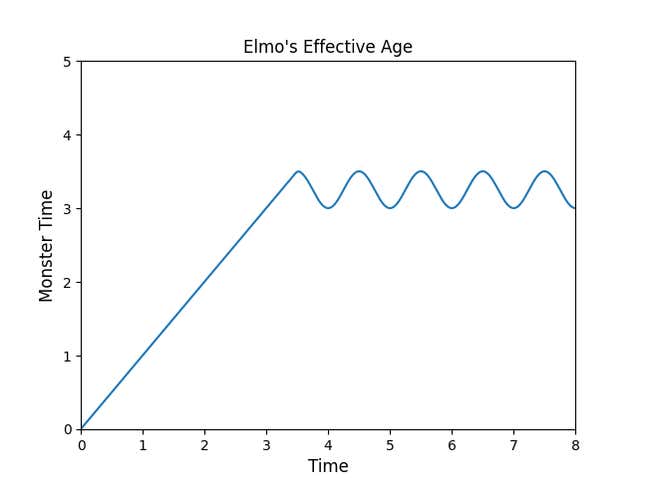Elmo celebrated his birthday earlier this month. The beloved children’s entertainer made his first appearance on Sesame Street in 1980, so it seems like a fair guess that he would have turned at least 44 years old this year. By any normal measure, Elmo should be a middle-aged man, but lurking in the details of his back story is a fact so bizarre that it strains our most basic assumptions about the universe. Elmo is three and a half years old—and every year, on February 3rd, he turns three and a half again.
The muppet has been in the news lately after he went viral with a tweet asking “How is everybody doing?” Some 40,000 people responded with some variation on “not great,” and Elmo made an appearance on the Today show to talk about the tweet and promote mental health. Toward the end of the segment, the hosts made a passing reference to Elmo’s age.
“You have a birthday coming up,” Today show host Hoda Kotb said. “On Saturday, you’re going to be three and a half again!”
“That’s right! Elmo’s going to be three and a half,” Elmo said. “Just like last year, and the year before, and the year before.” They went on to talk about Elmo’s plans, as if they were discussing any normal birthday and not an event that bends the fabric of time.
Elmo’s birthday is a matter of canon. Whenever Elmo’s age comes up, he cheerfully explains that he’s three and a half. It’s been that way for so long that kids who first heard about it decades ago have grown up and had kids of their own. But no matter how many birthdays Elmo has, he always turns three and a half. It’s also worth highlighting that February 3rd is Elmo’s birthday, not his half-birthday. Yet Elmo is already halfway through the year when the big day comes around.
Sesame Street has been on the air since the Nixon administration. But unlike so many other issues addressed on the show, including letters, feelings, shapes, and rubber duckies, the question of Elmo’s age has never gotten the attention it deserves. However, scientists do offer some possible explanations.
“My first thought is Elmo is experiencing gravitational time dilation,” Yuk Ting Albert Law, a theoretical physicist at Stanford University and a noted expert on general relativity, told Gizmodo.
It’s an idea developed by Albert Einstein. In places where gravity is stronger, time passes more slowly. So, for example, if you spent a year on Jupiter, you would age slightly less than your friends back on Earth during the same time period. The effect is subtle in most cases, but when you’re dealing with extremely massive objects, the differences can be dramatic.
Law suggested that Elmo is living near a black hole, but he loves his birthday so much that he chooses to celebrate it on our normal calendar because it comes up more often. In other words, that would mean Elmo is moving so slowly that, for him, almost no time has passed since he first turned three and a half.

On the other hand, the human residents of Sesame Street do seem to get older. Local music teacher Bob Johnson, for example, was clearly subject to the ravages of time. Johnson was a young man when he made his first appearance on the show in 1969, but when he moved away in 2016, you could see every one of the intervening years in the lines and wrinkles of his face.
But time dilation could still be the answer if Elmo is in the vicinity of a massive object that others don’t interact with. “A tiny black hole at Elmo’s home could be an explanation,” Law said.

Some experts Gizmodo contacted suggested that time travel could be the culprit, but Law said that’s unlikely. “Wormholes can be a mechanism for time travel, theoretically speaking, but I’m not sure how this helps,” he said. If Elmo were traveling back in time to celebrate his birthday, he would look older every year, while everyone else on Sesame Street would be the same age they were on the day Elmo first turned three and a half.
The time-traveling Elmo hypothesis also falls apart because Elmo isn’t the only one on Sesame Street who doesn’t seem to get older. Big Bird has been on TV for more than half a century, but he’s just six and a half years old. His friend Snuffleupagus is only five.
Gizmodo reached out to the Sesame Workshop, which represents Elmo and produces the Sesame Street television show, to ask if Law’s theories explain the birthday paradox.
“Elmo counts his birthday in monster years,” a Sesame Workshop spokesperson replied matter-of-factly. The spokesperson didn’t address questions about black holes or time travel.
Without more information, it’s hard to say exactly what that means from a scientific perspective. If the gravitational time dilation theory is correct, monster years could just be how Elmo and the other muppets describe their experience of the calendar.
But Steven Harrellson, who studied the intersection of physics and biology during his doctoral research at Columbia University, said these monster years demand a different solution. According to Harrellson, these monster years are explained by a theory of “Monster Time,” which he describes in a new paper.
“I believe that Elmo aged at the same rate we experience as humans until he turned three and a half years old,” Harrellson said. “But at that point, Elmo shifted over to Monster Time, and his age started to oscillate.”

Harrellson argued that every year, at some point after February 3rd, Elmo starts to get younger, almost as if time is going backward. Then, time reverses course and starts moving forward until he turns three and a half again on the next February 3rd. At that point, the process repeats itself.
That requires some additional assumptions. One of the fundamental underpinnings of science is that the laws of physics don’t change; they’re just complicated. In our human experience, time flows only in one direction. But the existence of Monster Time means there has to be some kind of negative “Monster Energy” that periodically pulls objects like Elmo backward. And if we have Monster Energy, that suggests that Elmo is interacting with some kind of exotic matter, a material that Harrellson calls “Monster Mass.”
“Einstein’s equations imply that Monster Mass must exist, but that’s future work,” Harrellson said. “The theory of Monster Time and Monster Energy is still in its infancy.”
There could be major implications for technology and industry if scientists could harness the understanding of Monster Energy. But for now, it seems there’s something that Elmo isn’t telling us. Or perhaps he doesn’t understand it himself. After all, he’s only three and a half years-old.

